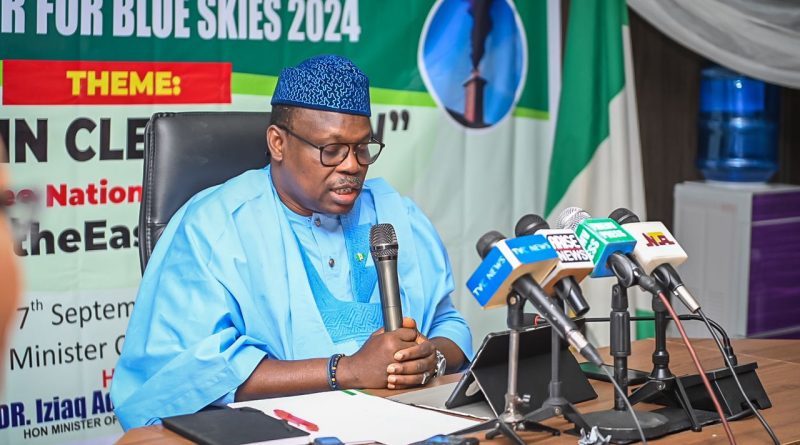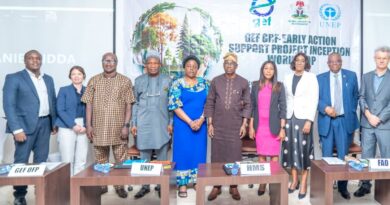Air Pollutants: FG Will Discourage the Importation of Old, Rickety Vehicles Through Appropriate Tariffs, Taxes And Incentives For Local Manufacturing, Assembling-Minister
Vehicular emissions have been identified as major problems that must be dealt with so as to improve our air quality. The Minister of State for Environment, Dr. Iziaq Adekunle Salako, said the Federal Government will continue to put measures in place including appropriate tariffs and taxes to discourage the importation of old and rickety vehicles, encourage local manufacturing and assembling of vehicles. He stated this at a press conference on September 7th, 2024 to mark the commemoration of this year International Day of Clean Air for Blues Skies; a day set aside by the United Nations General Assembly to “strengthen international cooperation in improving air quality and reducing air pollution” since 2020. The day is aimed at raising awareness at all levels on the importance of clean air for human and environmental health, productivity and economic growth. The agenda is to reduce all forms of air pollutants to 50% globally by 2030.
There is a growing concern about air pollution and the threat poor air poses to our existence with air pollution now regarded as the world’s single largest environmental health risk. It is estimated that 99% of the world’s population is breathing polluted air with dire consequences for everything we hold dear.
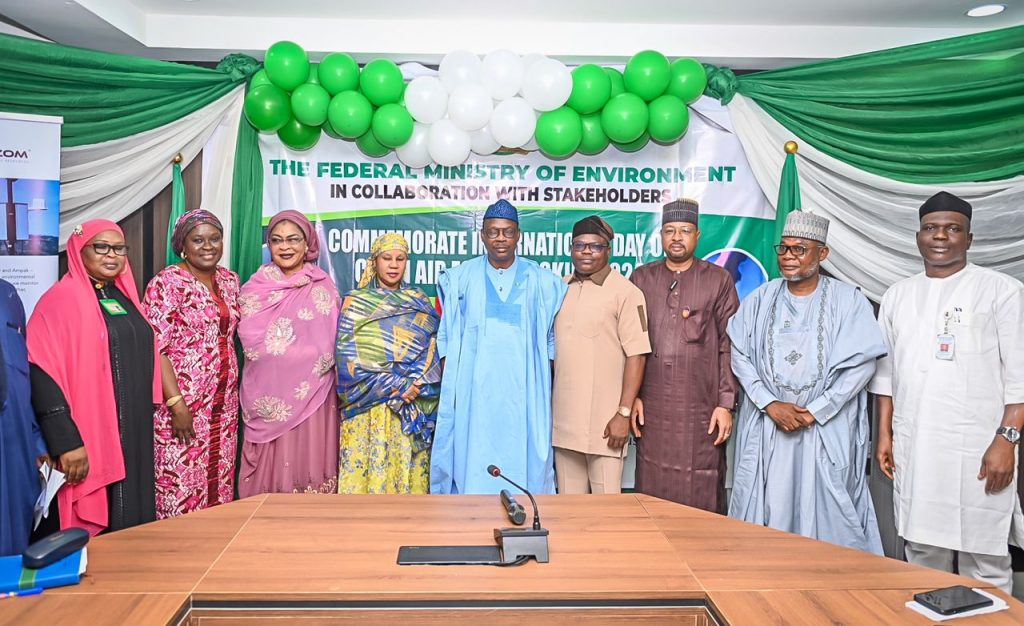
According to the State of Global Air, 2024, air pollution is the second leading risk factor for premature deaths resulting in around 8.1 million deaths annually from conditions such as stroke, heart disease, lung cancer, chronic obstructive pulmonary disease and acute respiratory infections. This is more than the death associated with malaria and HIV combined. Furthermore, a new research by the ISGlobal Barcelona Institute for Global Health and Barcelona – Beta Brain Research Centre in June 2023 confirmed that air pollution is directly linked to dementia and Alzheimer’s disease. Beyond the direct adverse effect on health, air pollution from green house gases, Short Lived Climate Pollutants (SCLPs), black carbon and so on are at the core of global warming which is the driver of climate change, climate disasters with loss of lives, food insecurity, economic losses, migration and physical insecurity challenges.
The Minister said, “Nigeria, as a country is faced with significant air pollution challenges and was ranked the 3rd most polluted country in Africa by the 2021 world air quality report. In 2023, the average PM2.5 concentration in Nigeria was 4.8 times of the World Health Organization annual air quality guideline value. Like most parts of the world, vehicular emission is the greatest contributor to air pollution, with the situation complicated in our country by the many old, second hand , third hand, in fact several hand automobiles plying our roads. Other sources include industrial activities, illegal refining, gas flaring, burning of refuse, household cooking and power generation.
“If we fail to take action and reverse the current high level of air pollution in our country and in the world, the repercussions for public health, our economy, the environment and our survival is far reaching. According to United Nations Environment Programme (UNEP), air pollution is estimated to cost the global economy 8.1 trillion USD per year equivalent to 6.1% of the global GDP due to increased healthcare cost.”
Salako said the Federal Ministry of Environment through its regulatory/enforcement agencies and in collaboration with other MDAs is working to improve the quality of air being inhaled by Nigerians using multifaceted policy instruments, legislations, programmes and projects to regulate, enforce and promote minimum air quality standards.
“The issue of vehicular emission is a major area that we need to deal with in improving our air quality. Government will continue to put measures in place including appropriate tariffs and taxes to discourage the importation of old and rickety vehicles, encourage local manufacturing and assembling of vehicles. The strategic agenda of President Bola Ahmed Tinubu GCFR to promote the use of alternative fuels such as compressed natural gas, liquefied natural gas and scale up electric vehicles penetration in our transportation system is a bold initiative that is good for our air quality. Similarly, the government continues to promote mass transportation system such as trams and rail not only for its cost-effectiveness but in order to reduce cumulative emission from the transport system that pollutes our air and chokes our public health.”
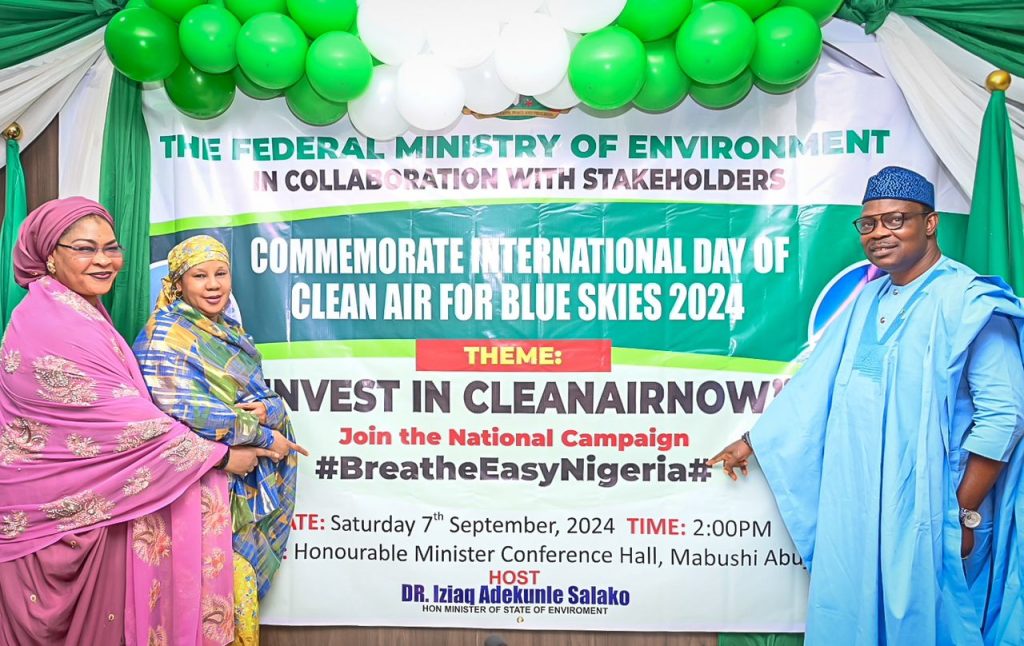
He said the Ministry of Environment has been working with sister ministries and agencies to switch to low-Sulphur fuels while Nigeria Industrial Standards (NIS) for Petroleum Products have been reviewed in line with AFRI IV Standards with the implementation expected to commence soon.
“The Federal Ministry of Environment is working to establish a national framework to guide States that are setting up vehicular and generator Emissions Testing Centres in line with minimum standards developed by the National Environmental Standards and Regulations Enforcement Agency (NESREA) and the Standards Organization of Nigeria. We are determined to ensure that vehicular and generator emission testings is not just about revenue but about compliance with National Ambient air quality standards. In addition, we have commenced a pilot scheme for Quality Assurance/Quality Control (QA/QC) Industrial Emission Monitoring Scheme (I.E.M.S) as a vital initiative designed to enhance the capacity to manage and mitigate industrial pollution across the country effectively. In the coming days, we plan to commence a national roll out of the QA/QC IEMS.
“In order to reduce the contribution of domestic cooking to air pollution, we have developed and we are implementing our National Clean Cooking Policy with the overall goal of achieving universal access to clean cooking energy solutions for households and institutions by 2030. In order to demonstrate government commitment to the clean cooking policy, we held a Clean Cook Fair earlier in the year to mobilize local investments for clean cooking technologies. In addition about 15,000 clean cook stoves will be distributed in 2024 across the country as part of an initiative being implemented by the Federal Ministry of Environment.
“Gas flaring and artisinal refining remains a major contributor to the pollution of our air. The National Oil Spills Detection and Response Agency (NOSDRA) has therefore commenced a gas flare down programme in line with the commitment of Nigeria to end routine gas flaring by 2030. In addition, as part of the Hydrocarbon Pollution Remediation Project (HYPREP), youths in Ogboni land are being trained in alternative livelihood in order to discourage artisanal refining”, the Minister noted.
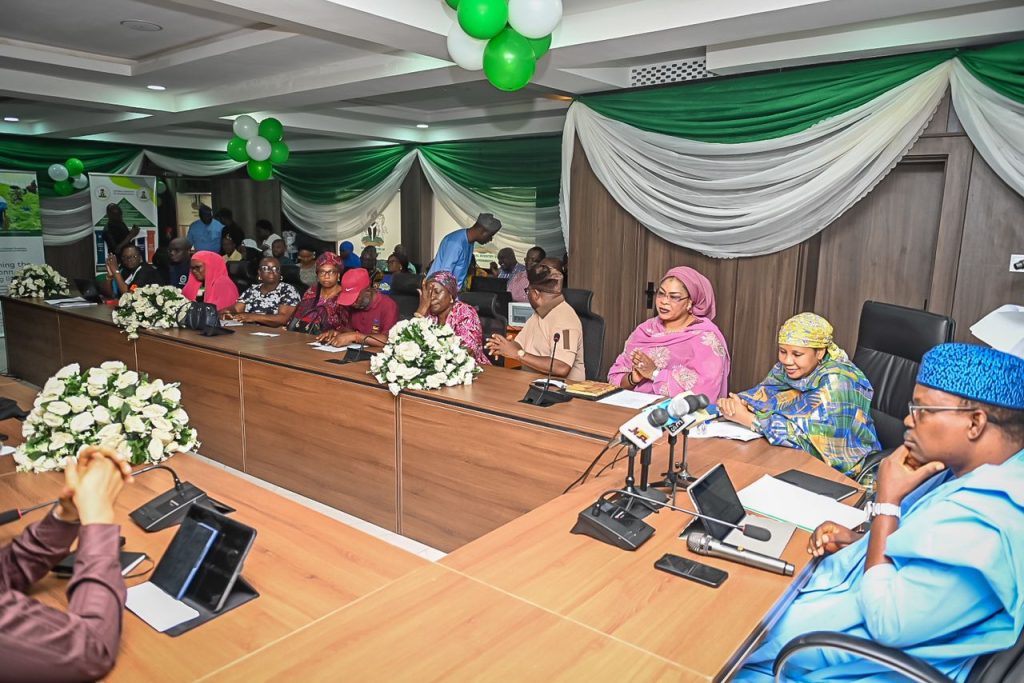
He said stakeholders are being engaged in the development of the National Policy on Air Quality Management as well as a Youth-led National Clean Air Programme which will work with celebrities and high net worth individuals as Clean Air Ambassadors. He added that the National Clean Air Campaign #BreatheEasyNigeria is expected to be launched soon.
“Our ultimate vision as a federal ministry is to establish air quality monitoring stations across the country to generate reliable database for sound policy making and environmental management with a final destination of deploying mobile App that can give real-time Air Quality Index for every major city in Nigeria. the challenges of air quality management are common to every part of the country with our activities as humans being the main driver. In order to address the challenges, we need everybody well informed and on board taking actions to improve our air quality. We count on you our ally in the media to inform Nigerians, create awareness and take the message home that our lungs deserves clean air. In the words of a popular evolutionary biologist and environmentalist, Guy McPherson; “you can’t count your money, while holding your breath”.
The Minister called on every level of government to prioritise air quality management and maintenance in their policies and programmes. He invited every Nigerian particularly the industrialists to be always mindful of their production process and activities and ensure that they are part of the solution.
Salako said, “Let’s go Greener to breath cleaner”.

